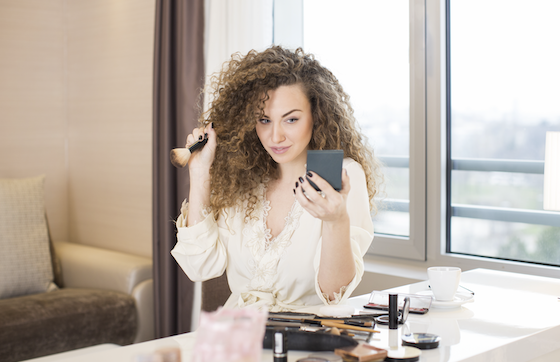If you thought that acne was only for the middle school set, think again. Pimples can pop up at any point in your life, especially when you’re stressed out or eating chips and dip instead of a healthy, well-balanced dinner. But acne can also occur due to hormonal shifts in your body (thanks, pregnancy and postpartum hormones) as well as other pre-existing medical issues. Luckily, you can zap those zits for good — and your birth control could be the answer.
Sure, contraception can help prevent an unwanted pregnancy, but it also has the power to help you save face — literally. “Oral contraception has been known to improve acne,” says Dr. Delisa Skeete Henry, M.D., FACOG of Serene Health OB/GYN & Wellness. “Birth control pills which have both estrogen and progestin can aid in the decrease of acne.”
So if you’re looking for a clearer complexion (and not planning to become pregnant anytime soon), this is what you need to know about birth control and acne.
Which Type Of Birth Control Is Best For Acne?
When it comes to birth control, there is one that eases acne’s eruptions. “The best form of birth control for acne is the combination oral contraceptive,” explains Dr. Renee Wellenstein, M.D., an OB-GYN and functional medicine doctor. “A combination oral contraceptive is one that contains an estradiol (a synthetic form of estrogen) and a progestin (a synthetic form of the female hormone, progesterone).”
There’s a reason why your doctor will want you to have a combination contraceptive in treating your acne issues. “Some prescribed acne medications are teratogenic, meaning they are detrimental to a pregnancy,” says Henry Skeete. “Dermatologists therefore prefer women on these medications to have some form of birth control to prevent pregnancy because the combination of oral contraception and prescribed acne medication is likely superior to the one by itself in treating acne.”
How Does Birth Control Help With Acne?
“Combination estrogen and progestin pills have anti-androgenic effects which decreases testosterone levels,” says Skeete Henry. “This decrease in androgens helps to decrease the production of sebum, the oily, waxy substance produced by the sebaceous glands in our skin.” How does it help? Well, the combination of estrogen and progestin pills increases globulin, a protein sex hormone which binds to (and decreases) the amount of testosterone circulating through your body. And when testosterone is tamed, the skin is less likely to produce excess sebum, a major contributor to acne.
How Long Does It Take For Birth Control To Help Acne?
While oral contraception can be the cure for your acne, don’t expect those whiteheads will be whisked away immediately. It can be a waiting game until you see visible results, according to a study published in Dermatologic Clinics. Researchers found that combination oral contraceptive bills can take up to three cycles to improve acne and lessen the lesions.
Are There Risks To Using Birth Control To Help Acne?
As with any medications, there are always the rewards — and the risks. “There are health risks to taking oral contraceptives,” advises Wellenstein. “They should only be considered for those healthy women who desire contraception in addition to treatment of acne or in those women who have tried other means of controlling their acne.” Some of the possible side effects include weight gain, nausea, fluid retention, headaches, breast tenderness and mood changes. And then there are more serious risks to your health, like blood clots, stroke, and even a heart attack. That’s why you should speak with a dermatologist as well as your OB-GYN to determine what medication management system would work best for you.
If you’ve tried everything from aloe to ice, tea tree oil to benzoyl peroxide and haven’t seen a change in your complexion, you may want to consider a combination oral contraceptive. It can treat your acne and also prevent pregnancy — which can also be a treat, too.
Experts:
Dr. Renee Wellenstein, M.D., an OB-GYN and functional medicine doctor
Dr. Delisa Skeete Henry, M.D., FACOG of Serene Health OB/GYN & Wellness.
Study cited:
Harper, J. “Use of Oral Contraceptives for Management of Acne Vulgaris: Practical Considerations in Real World Practice” Dermatological Clinics, 2016

